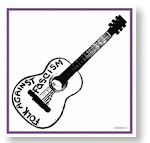
Launch gig Oct 25 at Uzura Gallery (Showa era Dental Surgery) details here.
Mine just released their new second album "Ethno".
The band members are Shimizu Shunsuke on flutes, Tsuyoshi Tatebe on wood bass, Genta Fukue (also of Butterdogs) on guitar and Kouji Tamura on fiddle. Guesting on two tracks each are Issaku Yamamoto on fiddle and Felicity Greenland (that's me) on bodhran and vocals.
Mine are usually called an Irish band, and indeed their first album, Minability, was based on Irish trad melodies. However, although they were clearly captivated by the contemporary recordings (such as Lunasa and Flook) they had learned from, at times they made you ponder what else might become of trad music without its cultural reference points.
Ethno takes a step towards answering that question. By the time Mine reach this second album, the 'Irish band' suffix denotes the music's ambience rather than provenance. With a wider range of influences, all original tunes, and two sets of songs from France and the Hebrides, this album is about as Irish as, well, as a Japanese man with an Irish flute. It does trace familiar rhythms and shapes - hints of an old air, glimpses of dancing, a sense of flight - and as a result it could certainly be said to seem Ir-ish, but now with Japanese harmony between the leads, vivid street guitar, a jazz sprite in the bass, it is all cast in a more varigated light. Their original influences are still clear, but they are less encumbered by them. That is how the songs are approached too: Bertaeyn is patches of two French songs tied by a common walking-maid motif - neither tale is complete but together they make a new story; Mouth Music (a three song set) has been learned through a Chinese-whispers chain of non-speakers of the original languages (Hebridean and Irish) - it may retain fragments of the original meaning but more likely it has taken on a life of its own.
Mine grew out of the Irish sessions in Kansai area, but I think they are only called an Irish band for want of a better word now. Their music is neither traditional nor Irish, yet it plays no small part in the warm reception, particular perception, and evolution of Irish music in Japan.
Two tracks from the album Ethno released Oct 2008
Track 3: Bertaeyn: Le Garcon Jardinier/Hanter Dro (Desous les Lauriers Blancs)
Track 6: Mouth Music

